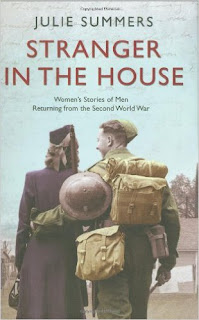Stranger in the House
Stranger in the House: Women's Stories of Men Returning from the Second World War, by Julie Summers
I enjoyed Home Fires so much that I promptly requested Stranger in the House, which is all about the British husbands, fathers, and boyfriends who came home when the war was over. It could be a very difficult adjustment for everyone, and of course many men never recovered from their experiences.
Summers organizes a large number of personal stories into chapters by relationships; there are the mothers, the widows, the wives and the children. She doesn't try to do lots of analysis, but simply presents story after story with some short comments, mostly allowing people to speak for themselves. It's an excellent approach, because the stories are as varied as the people, and generalities are difficult. Most families had some difficult readjusting to do, but some had an easy time. Some families fell apart or never really recovered, though it's not always the ones you'd think. Both men and women were sometimes unfaithful to their partners, and had to deal with guilt and forgiveness...or not.
Quite a lot of space is given to the men who were taken prisoner in the Far East. These men had had no contact with the rest of the world for years; they had been maltreated, tortured, and starved; and they usually had several tropical diseases or health conditions. They also had the hardest time acclimating to normal life, and carried deep scars. Summers shows several of the children--who often feared and resented their fathers while they were still alive--learning about what they had been through and coming to realize what those ordeals had meant for the rest of their lives.
It's a fascinating book that does valuable research into a part of family life that was often glossed over at the time. I didn't love it as much as Home Fires. It didn't feel quite as organized, but I think that's the nature of the matter. I still didn't want to put it down, though, and read it quickly.
I enjoyed Home Fires so much that I promptly requested Stranger in the House, which is all about the British husbands, fathers, and boyfriends who came home when the war was over. It could be a very difficult adjustment for everyone, and of course many men never recovered from their experiences.
Summers organizes a large number of personal stories into chapters by relationships; there are the mothers, the widows, the wives and the children. She doesn't try to do lots of analysis, but simply presents story after story with some short comments, mostly allowing people to speak for themselves. It's an excellent approach, because the stories are as varied as the people, and generalities are difficult. Most families had some difficult readjusting to do, but some had an easy time. Some families fell apart or never really recovered, though it's not always the ones you'd think. Both men and women were sometimes unfaithful to their partners, and had to deal with guilt and forgiveness...or not.
Quite a lot of space is given to the men who were taken prisoner in the Far East. These men had had no contact with the rest of the world for years; they had been maltreated, tortured, and starved; and they usually had several tropical diseases or health conditions. They also had the hardest time acclimating to normal life, and carried deep scars. Summers shows several of the children--who often feared and resented their fathers while they were still alive--learning about what they had been through and coming to realize what those ordeals had meant for the rest of their lives.
It's a fascinating book that does valuable research into a part of family life that was often glossed over at the time. I didn't love it as much as Home Fires. It didn't feel quite as organized, but I think that's the nature of the matter. I still didn't want to put it down, though, and read it quickly.





This sounds like an interesting part of the history that isn't so often told. Have you seen the film The Railway Man? It covers some of the same territory.
ReplyDelete